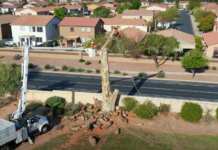By Miriam Ordonez / ASU Cronkite School of Journalism
Proposition 207, which would allow adults over the age of 21 to possess and grow small amounts of marijuana and amend criminal penalties for the possession of the drug, is on the ballot in Arizona, but polls say the outcome is too close to call.
If Prop 207 passes, Arizona will join 11 states who have legalized weed, including neighbors California, Nevada and Colorado. Both advocates and opponents of legalization say the vote in the Nov. 3 election could decide the issue one way or the other for years to come.
A recent poll by OH Predictive Insights shows the ballot measure vote should be a close one; 600 likely voters were interviewed by phone in Arizona. The results showed 46% in support, 45% oppose and 9% remain undecided.
Smart and Safe Arizona is the leading campaign in support of Prop 207. More than $3 million has been spent to promote the measure.
The initiative would levy a 16% tax on marijuana sales. Stacy Pearson, a political consultant for Smart and Safe Arizona, said the tax is expected to generate “about $300 million a year, and that will go back into the community.”
Funding would go to police, fire departments, community colleges, highways and roads. “The taxpayers really stand to gain the most,” Pearson said.
Pearson said passing the bill “will lower tuition in community colleges.”
Additionally, it will give the Department of Health Services money for addiction prevention, substance abuse treatment and other programs to help people. The DHS will have oversight of sales, testing and inspection of marijuana products.
Individuals will also be allowed to grow a maximum of six marijuana plants in their primary residence.
If Prop 207 passes, courts “could vacate and expunge certain marijuana arrests, charges, adjudications, convictions, or sentences.”
That could help thousands of Arizonans move on with their lives, according to Pearson, who said those with marijuana possession violations on their records are “eligible for expungement, and so they can get their records sealed and then that felony arrest or conviction won’t haunt them anymore.”
Pearson said many people with marijuana convictions will be able to buy a house or get a decent job for the first time in years. The expungement would start as early as July 12, 2021.
Smart Approaches to Marijuana, also known as SAM, is a national organization that opposes Prop 207.
“Marijuana legalization has been shown to lead to more crime, more use across all age groups, more addiction rates, more exposures to minors and subsequent hospitalizations and emergency room visits, increased black market and drug trafficking activity, and increased impaired driving accidents and fatalities,” said Colton Grace, the communications associate for SAM.
Advocates for legalization say it’s time Arizona legalizes marijuana, but Grace disagrees.
“Legalizing marijuana in Arizona won’t generate social justice or equity, it won’t bring the state a windfall of tax revenue, and it will do nothing to stem the state’s existing issues with cartel activity,” he said. “Instead, it will enrich existing corporations while leading to further harms to health, safety and commonsense.”
The AAA Foundation for Traffic Safety estimated in 2019 that nearly 14.8 million Americans are “driving within an hour of marijuana use. The effects of using marijuana are experienced in the first one to four hours.”
Drugabuse.gov states frequent marijuana use can cause short-term and long-term health issues like IQ loss, altered senses, impaired body movement, hallucinations, delusions and psychosis.
According to The Journal of the American Medical Association, JAMA Psychiatry, Cannabis Use Disorder (CUD) increased by 25% for youngsters ages 12 to 17 in states where marijuana is legalized.
Prop 207 will require all packaging to be childproof and ban the sales of marijuana products that resemble candy to protect children from ingesting the drug.
Prop 205, a similar initiative for legalizing marijuana, failed four years ago.
“In 2016 it was a very different initiative, it did not have criminal justice reform, so there was no expungement on there,” Pearson said. “It also did not allow employers to continue to prohibit the use, which is important.”
Two marijuana-selling corporations, Harvest and Curaleaf, helped draft the ballot measure and funded more than $2 million of the legalization campaign. “By funding and writing the ballot measure, they are ensuring their monopoly will be set in stone,” said Grace.
Approval of the measure would mean “more people using marijuana, more impaired drivers on the road, and further normalization of a drug that can have serious impacts on the mental health and well-being of young people,” Grace added.
Early voting, both in person and by mail-in-ballot has already begun in Arizona.


![Elena Trails releases home renderings An image of one of 56 elevation renderings submitted to Maricopa's planning department for the Elena Trails subdivison. The developer plans to construct 14 different floor plans, with four elevation styles per plan. [City of Maricopa]](https://www.inmaricopa.com/wp-content/uploads/2024/04/city-041724-elena-trails-rendering-218x150.jpg)
![Affordable apartments planned near ‘Restaurant Row’ A blue square highlights the area of the proposed affordable housing development and "Restaurant Row" sitting south of city hall and the Maricopa Police Department. Preliminary architectural drawings were not yet available. [City of Maricopa]](https://www.inmaricopa.com/wp-content/uploads/2024/04/041724-affordable-housing-project-restaurant-row-218x150.jpg)












![Elena Trails releases home renderings An image of one of 56 elevation renderings submitted to Maricopa's planning department for the Elena Trails subdivison. The developer plans to construct 14 different floor plans, with four elevation styles per plan. [City of Maricopa]](https://www.inmaricopa.com/wp-content/uploads/2024/04/city-041724-elena-trails-rendering-100x70.jpg)

![Affordable apartments planned near ‘Restaurant Row’ A blue square highlights the area of the proposed affordable housing development and "Restaurant Row" sitting south of city hall and the Maricopa Police Department. Preliminary architectural drawings were not yet available. [City of Maricopa]](https://www.inmaricopa.com/wp-content/uploads/2024/04/041724-affordable-housing-project-restaurant-row-100x70.jpg)